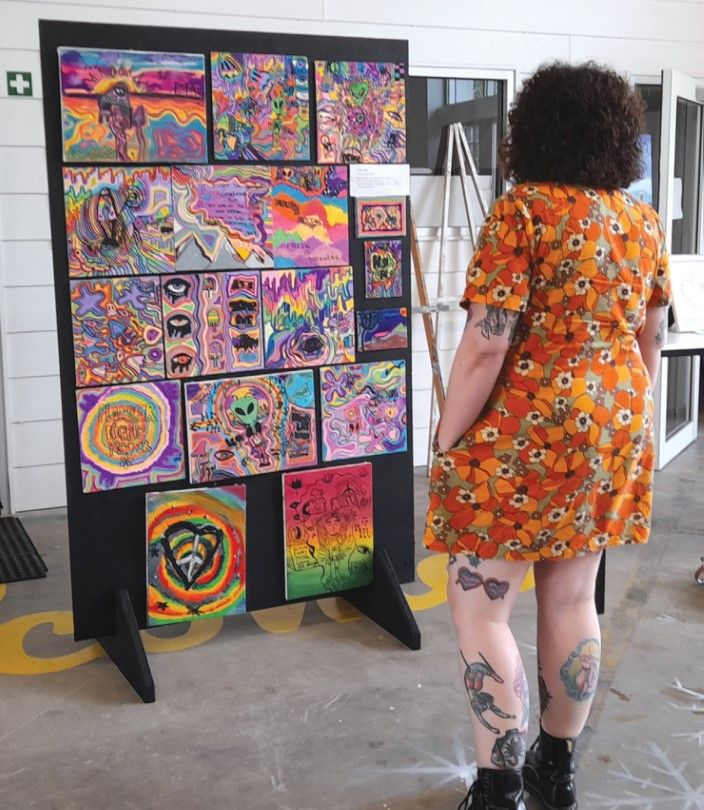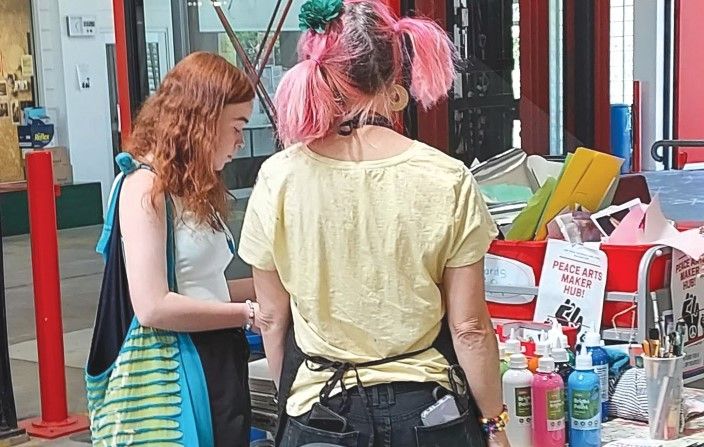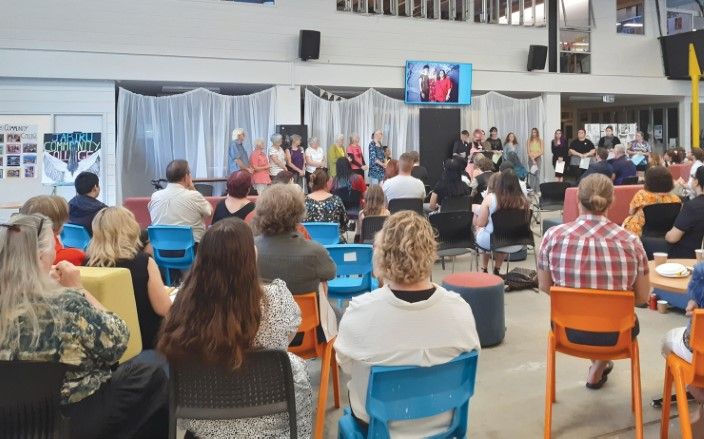
Students at Jabiru Community College (JCC) were recently recognised for their commitment to peace and non-violence through the Special Assistance School’s Peaceful Pathways Awards and “Peace is …” Art Prizes, writes Emily Campbell.






































































































































Peaceful pathways
2023 March IE


Students at Jabiru Community College (JCC) were recently recognised for their commitment to peace and non-violence through the Special Assistance School’s Peaceful Pathways Awards and “Peace is …” Art Prizes, writes Emily Campbell.

IEU member and JCC Maker Space Coordinator Robin Taubenfeld said the inaugural awards were launched last year in a bid to celebrate students’ peacemaking, peacekeeping and peacebuilding in the local community.

“JCC is a Special Assistance School (SAS) in Zillmere, north of Brisbane, which caters for students who are disengaged from mainstream schooling and often come from difficult or traumatic backgrounds,” Robin said.
“Prior to working at JCC, I was already involved in exploring peace education and interested in the military’s incursion or presence in education.
“In 2021, we established the series of awards as a way of recognising the contributions of young people at JCC towards creating and maintaining peace in the community.
“As a migrant to Australia, I feel it’s a necessary commitment to do what I can do to address the colonisation, militarisation and nuclearisation of Australia and this region.
“I raised with colleagues the possibility of offering a peace award to our young people and staff were onboard with the idea.
“I canvassed various Brisbane peace groups who were keen to be involved, so it was easy to raise the funds to offer a peace prize to students at our school.
“Many peace movement elders were interested to see how we could develop an award to celebrate peace and eventually expand it to other high schools,” she said.
Joan Shears Peaceful Pathways Award
Robin said the inaugural Peace Prize Award was named after the late Joan Shears OAM, a Brisbane local who dedicated her life to working for peace and social justice.
“The Joan Shears Peaceful Pathways Award offers two major prizes of $400 each for young people who have been actively involved in peacemaking, peacebuilding or peacekeeping in the community,” Robin said.
“Joan was an amazing connector and stalwart of the Brisbane peace and anti-nuclear movement since the 1970s, so it was proposed we honour her as a local peace hero,” she said.
“We’ve called it the Joan Shears Peaceful Pathways Award to recognise there are so many pathways to peace.
“We wanted to acknowledge what Joan always said, that is “Peace is more than just the absence of war”.
“We see that sometimes violence is glorified in our society and there’s a lot of fanfare around military activity, but in our communities, we have amazing people like Joan and hundreds of others who are doing peace grounding, community building ‘peace work’ and that we want to young people to be able to connect with them.
“In the spirit of democratising the Awards, we opened nominations up to the whole community inviting young people to nominate themselves or their peers.
“We also opened nominations up to all young people across the school, which allowed nominees of any age to be rewarded based on their merit.
“All nominees received a certificate, a small native plant, peace poppy and acknowledgement of what had been noticed about them by the staff or their peers to who nominated them for a Peace Award,” Robin said.
Peace Is… Art prize
In 2021, JCC also introduced the “Peace is…” Arts prize, where students are invited to reflect upon peace through a creative submission.
Robin said students could create a text or art piece responding to the theme “Peace is….” and entries may be in any art form, such as written or spoken word, poetry, theatre, music, dance, photography, craft etc.
“I think the students who participated got a lot out of it and it was really moving to see on display the different kinds of reflections young people had on peace or what it meant to them,”she said.
“Some students created really touching art about their family or relatives who had passed away, whereas others were political and digital, so the diversity of entries was amazing.
“Last year we ended up awarding each of them a prize because we identified that each student had addressed a different aspect of peace, whether it be the environment or a family connection theme.
“This year, we had seven young people and two staff enter the Peace Is… Arts Prize Exhibition and all young people were awarded prizes between $50 and $100 for their contributions.
Building positive relationships
Robin said it was a privilege to work in an organisation that is committed to embedding and facilitating learning around non-violence.
“Another special thing about JCC is that we practise an Alternatives to Violence Project (AVP), which is a social justice movement I’ve been involved with as a volunteer for a very long time,” Robin said.
As detailed in a previous edition of IE, AVP is a training program which originated during the Civil Rights era in the United States and equips participants to deal with potentially violent situations in new and creative ways.
AVP gives participants a framework for responding to conflict and difficulty in all types of relationships and human interactions.
Robin said a central tenet of both AVP and JCC ethos is the importance of relationships.
“What I really love about working at JCC is the commitment to justice that embodies our work and our team which translates to respect and support for the young people we work with,” Robin said.
“Building relationships is key, it’s fundamental to working with our young people and each other,” she said.
Power of the collective
As union Chapter Rep at JCC, Robin is a big believer in the power of the collective and collaborative action.
“I think it’s important to be part of our union and social justice movements because those of us who have the capacity to stand up and fight, to challenge dominant structures should do that when we can, because there are others, less fortunate, who can’t.
“Previously I was in a workplace that wasn’t a school where we were doing frontline community support work and it wasn’t very unionised, which was frustrating because I could see how much energy the staff put into helping others, but their jobs were at risk or their conditions weren’t great.
“I’ve been excited to see our union campaigning around working conditions and aspects like the Nationally Consistent Collection of Data (NCCD).
“It’s reassuring to know other teachers and schools are having the same concerns as our school and that somebody is advocating on our behalf around these issues.
“Union presence helps us refocus and reflect on our roles and how we want to contribute to our community or workplace,” Robin said.
Commitment to expansion
Robin said many of the peace groups involved in helping fund and establish the Peace Prizes at JCC were interested in helping other schools around Australia establish their own Peace Awards.
“At the Peace Awards night last year, we had several different peace and environmental group representatives attend to present the awards, and some of them have since visited our school or have volunteered to help with our activities,” she said.
“It’s important that young people not only hear about great humans like Joan Shears, but they get the opportunity to meet and build connections with local peace heroes and can become involved with peace organisations in their local community.
“We are committed to expanding peace celebrations, so any fellow IEU members or schools who are interested in establishing their own Peace Awards can contact me for assistance with fundraising, organising and connecting with peace groups.
“International Day of Peace falls on 21 September, but every day is a good day to celebrate peace and non-violence in the community,” Robin said.
IEU members who are interested in establishing their own peace awards and would like further information or advice are encouraged to contact Robin at r.taubenfeld@jcc.qld.edu.au